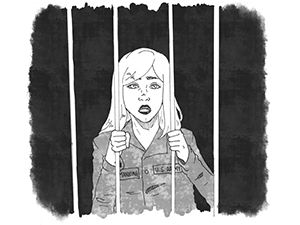
A day after U.S. Army Pvt. Bradley Manning was found guilty of 20 charges, which included espionage, theft and fraud, a statement was released in which Manning expressed that she would like to be known as Chelsea E. Manning and be referred to by female pronouns.
She plans to undergo hormone therapy as soon as possible in Fort Leavenworth military prison in Kansas where she is due to serve her 35-year sentence for having leaked hundreds of thousands of classified documents to the website Wikileaks.
Kimberly Lewis, a spokesperson for the prison, told NBC News that the Army doesn’t provide hormone therapy or sex-reassignment surgery. In an article by The Guardian, the prison stated that it does not provide transgender treatment beyond offering psychiatric support.
In the same article in The Guardian, Mara Keisling, who is the executive director of the National Center for Transgender Equality stated, “It is illegal, it’s unconstitutional. That is fairly settled law under the Eighth Amendment against cruel and unusual punishment. The medical community is now unified that transition-related care is legitimate medical care that can successfully treat a serious underlying condition.”
According to the Legal Information Institute, although prisoners do not have full constitutional rights, they are still protected by the Eighth Amendment against cruel and unusual punishment which is crucial because it supports Manning’s case to receive the care she is asking for.
The condition that Keisling refers to is a gender identity disorder (GID), specifically called gender dysphoria, and its treatments usually include psychotherapy, hormone replacement therapy and sex reassignment surgery. In order to properly treat gender dysphoria, all three are required – although at this time Manning is not asking for surgery.
It has been observed that some of the common symptoms that come with gender dysphoria may include withdrawal from social interaction, anxiety, feelings of isolation, depression, and in serious cases, suicide.
If a prison is refusing to provide the medical procedures necessary to treat Manning’s transitioning, it can be seen similar to torture, which is under the Eighth Amendment to protect against cruel and unusual punishment.
In one case in 2011, Fields v. Smith, the U.S. Court of Appeals for the Seventh Circuit dismissed a Wisconsin law that banned access to hormone therapy and sex reassignment surgery for prison inmates. It was found here that the ban violated the inmate’s Eighth Amendment right and the court stated that “refusing to provide effective treatment for a serious medical condition serves no valid penological purpose and amounts to torture.”
Although this decision was not made into a law, it is obvious that Manning has a reasonable expectation to receive the necessary care to treat gender dysphoria in order to prevent any of the above symptoms.
In an article written on Aug. 27, 2013 by the Huffington Post, Manning’s lawyer David Coombs, stated that Chelsea has offered to pay for her own treatment.
“It’s just to be comfortable in her own skin,” Coombs said and described it as being similar to ensuring that someone with high blood pressure gets medication.
Since Manning has been diagnosed with gender dysphoria, which can result in serious symptoms if left untreated, the proper treatment must be offered. If it is not offered then it can easily be seen as a form of torture.
Although Chelsea Manning did commit a crime against the United States, she is a still a citizen and as a citizen, she deserves to have her rights respected and rightly implemented.
The reason I feel so strongly about Chelsea Manning’s case is because at the early age of 12, my aunt sat me down and asked me, “How do you feel about gay people?”
Even though I was surprised by what I thought was a random question, I responded almost immediately.
“I think people should be with who they want to be with,” I said. “If two people love each other, then there’s nothing wrong with it.”
I could see the smile grow across my aunt’s face.
“I’m so happy you said that,” she said. “Now I feel comfortable telling you that I’m gay.”
Although she doesn’t know it, my aunt taught me the true meaning of being yourself no matter what anyone might say. Manning did commit a crime and must now deal with the consequences of her actions but that doesn’t mean she should be denied her rights.






